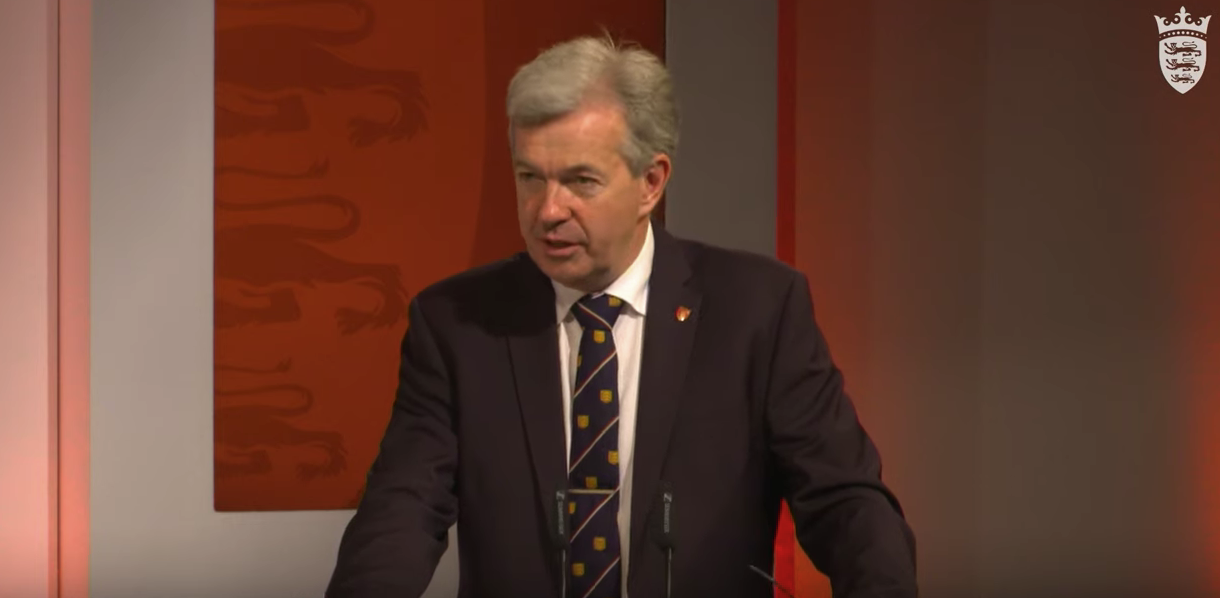


More information has emerged about the data medics used to underpin their latest covid advice, and the difficulty of achieving so-called 'herd immunity' against covid in Jersey, in a letter from the Chief Minister to Scrutiny.
On 21 June, STAC – the government’s scientific advisory cell – was presented with a range of scenarios, based on the estimate that vaccination provides full immunity in 95% of those vaccinated.
Those scenarios showed that, even if 94% of the eligible population - those aged 18 and upwards - were vaccinated, mitigating measures would still be needed to stop the spread of covid.
If all covid restrictions were removed, children would also have to be vaccinated to help achieve herd immunity. However, children are not currently eligible, with current advice only allowing for vaccination of 16 to 18-year-olds who have high-risk conditions, or are studying or in training for health and social care work.
The UK’s Join Committee on Vaccination and Immunisation (JCVI) - which Jersey follows in policy decisions - is currently awaiting more data on the routine vaccinations for children, but for now say “the minimal health benefits of offering universal covid-19 vaccination to children do not outweigh the potential risks.”
In his letter, Senator Le Fondré told politicians responsible for scrutinising the Government's approach to the pandemic that this subject is being "reviewed by the JCVI currently and we are awaiting imminent advice from the committee, which has been reviewing the evidence and risk/benefits of vaccinating under 18 years old."
Currently, around 60% of the island’s population has had two doses of the vaccine. The covid restrictions currently in place include mask-wearing in public places, no nightclubbing or stand-up drinking, “strong advice” to work from home and maintain physical distancing.
The Chief Minister's letter came in response to a number of questions from Scrutiny about vaccination.
Speaking about the estimates, Senator Le Fondré said that "63% of the adult population have been fully vaccinated in Jersey (as of 4 July 2021), so it is clear that community immunity [another phrase for 'herd immunity', ed.] has not yet been realised."
He added that, "according to Public Health England, vaccine efficacy against symptomatic infection is considered to be 80%, against hospitalisation 96% and against death 98%.
"Currently [under] 18 year olds cannot be vaccinated (unless very vulnerable) i.e. only some 80% of our population is eligible for vaccination. But disease has been shown to be generally much milder in young people."

Pictured: Chief Minister Senator John Le Fondré said the island was still awaiting the JCVI's further advice on the vaccination of children.
Scrutiny also asked if a conscious decision taken to allow covid to spread in schools, and if policies related to under-18s would be changed for summer.
The Chief Minister replied to this query by stating that "a balance of harms approach" had been taken towards the pandemic," and acknowledged "some people will not be eligible for vaccination."
He added that "such individuals will become infected at some point – if they are, then it is better to be infected during the summer when there are fewer concomitant respiratory viruses."
Dr Ivan Muscat had addressed this point at a previous press conference, saying that infections amongst young people were "happening naturally", and there was not a conscious push for them to achieve herd immunity.
"We are not deliberately going out this summer to achieve herd immunity but we are as our major strategy behind all this aiming at some point to reduce covid to an influenza-like burden and to do that it does mean that through time a number of people will have had some exposure to covid either in the form of vaccine – and we hope that would be the vast majority – or through natural infection and that will then reduce covid to an influenza-like burden which causes some pressure but not the type of pressure we are seeing now," he explained.
"We are not trying to push infection through the community in order to achieve herd immunity, we are not playing that game, that approach had actually been used in Sweden at one point where they shielded the vulnerable and went for herd immunity – that was in the complete absence of vaccination – and in retrospect they found that the burden of disease they had to manage together with the effect on the economy was worse than in surrounding Scandinavian countries that had a similar culture and are therefore immediately comparable. So we are not going down that road."
"…It is true to say though that if some people cannot be vaccinated – and I’m talking primarily about young children under the age of 10 who at the moment are not going to be vaccinated unless they are very very vulnerable and at the moment secondary school children are not being vaccinated either, then if infection were to occur in those age groups it is better for them to have infection in summer than in winter when there will be co-circulating influenza and RSV and other respiratory viruses and the last thing you would want is for people to be co-infected with different viruses at the same time or for there to be an overlay of different viral illnesses putting pressure on the health services as a whole so in a sense summer is better for covid than winter but we are not taking the opportunity of using summer to drive that, that is happening naturally."
According to the latest publicly available data, 39% of islanders between 18 and 29 years old are still yet to get their first jab.
28% of 30 to 39-year-olds have not been vaccinated at all, 16% of 40 to 49-year-olds, 9% of 50-59-year-olds, and 7% of 65 to 65-year-olds.
All other age groups have achieved 98% take-up or higher.
The Government recently started a walk-in programme this week to encourage those who had not yet been jabbed too, having had 47 walk-ins on their first day.
Here is the World Health Organisation’s definition: “'Herd immunity', also known as 'population immunity', is the indirect protection from an infectious disease that happens when a population is immune either through vaccination or immunity developed through previous infection. WHO supports achieving 'herd immunity' through vaccination, not by allowing a disease to spread through any segment of the population, as this would result in unnecessary cases and deaths.”
WHO is clear that attempts to reach herd immunity through deliberately exposing people to a virus are “scientifically problematic and unethical.”
“Herd immunity against covid-19 should be achieved by protecting people through vaccination, not by exposing them to the pathogen that causes the disease.”
While infection can provide some level of immunity, Dr Ivan Muscat MBE has explained that the vaccine provides a “more long-lasting immunity than natural infection.”
In comparison he said that an approach in Sweden where they went for herd immunity without a vaccine, had found that "the burden of disease they had to manage together with the effect on the economy was worse than in surrounding scandanavian countries that had a similar culture..."
On the process of how vaccines help build immunity, WHO explained: “Vaccines train our immune systems to create proteins that fight disease, known as ‘antibodies’, just as would happen when we are exposed to a disease but – crucially – vaccines work without making us sick. Vaccinated people are protected from getting the disease in question and passing on the pathogen, breaking any chains of transmission…
“To safely achieve herd immunity against covid-19, a substantial proportion of a population would need to be vaccinated, lowering the overall amount of virus able to spread in the whole population. One of the aims with working towards herd immunity is to keep vulnerable groups who cannot get vaccinated (e.g. due to health conditions like allergic reactions to the vaccine) safe and protected from the disease.”
This varies depending on the infectious disease.
To take measles as an example, 95% of a population need to be vaccinated – the remaining 5% who are not inoculated are protected by the fact that it will not spread among those who are vaccinated.
The proportion needed for covid-19 is not yet known, and is still being researched.
Currently, Jersey's adult population is not entirely vaccinated. According to the figures presented to STAC, even with restrictions still in place that halve the transmissibility of the delta variant, 94% of the current eligible population would still need to be vaccinated before herd immunity is achieved.
This number then increases to 103% - meaning the current eligible population, plus a proportion that are not currently eligible i.e. children - if restrictions are in place that cut down transmissibility by a third.
And to achieve herd immunity with no restrictions at all, the figure stands at 113%.
With vaccine uptake in the low currently young and a 94% vaccination figure seemingly the lowest possible scenario for achieving some form of herd immunity, the island would still have some way to go if it wanted to achieve it.
Dr Ivan Muscat has erred on the side of caution and said Jersey will not be pursuing a herd immunity strategy, but did suggest that through exposure both under the vaccine and infection, they could reduce the virus to an influenza-like infection eventually.
"We are not deliberately going out this summer to achieve herd immunity," he said.
"But we are as our major strategy behind all this aiming at some point to reduce covid to an influenza-like burden and to do that it does mean that through time a number of people will have had some exposure to covid either in the form of vaccine – and we hope that would be the vast majority – or through natural infection and that will then reduce covid to an influenza-like burden which causes some pressure but not the type of pressure we are seeing now."
Comments
Comments on this story express the views of the commentator only, not Bailiwick Publishing. We are unable to guarantee the accuracy of any of those comments.